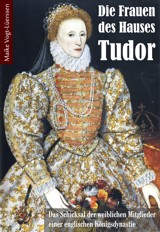Frauen in der Renaissance – 30 Einzelschicksale
seit Oktober 2017 als Buch in überarbeiteter Version bei amazon.de erhältlich, 432 Seiten, mit 304 SW-Bildern, € 20,20; ISBN 978-1-5498-9445-9
ab Dezember 2014 als E-Book in überarbeiteter Version bei amazon.de erhältlich, mit 346 Bildern (davon 268 in Farbe), € 18,03







